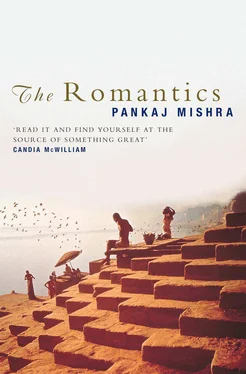I CAME TO KNOW RAJESH slightly better over the weeks that followed. But I felt easier in Miss West’s company; the world she represented held me more than the university, whose recurring tensions I found too familiar.
There had been an awkward moment with her after the party. I had been the earliest to leave and go to bed that evening. I was always in bed by ten, although this was one of my rules I was soon to break. The party had continued — I had gone to sleep with the soothing notes of Anand’s sitar in my ear.
Early next morning I was awakened by the now familiar sounds of someone using the roofless toilet at the top of the stairs. There was no flush system in the toilet; we had to splash water from a large rusty Nestlé powdered-milk tin after filling it up from a tap that seldom worked. I heard the creak of the tin door, the hollow gurgle of water rolling down into the hole in the ground, and then the futile repeated tweakings of the dry tap.
And then I heard something else: sniffling sounds, as though produced by suppressed sobs. They went on for a while. I lay there in the half-dark, listening, and then got up to investigate.
It was chilly out on the roof, where smoke from Shyam’s cooking fire below was already rising through the bluish air. Miss West was still in her soft brown party dress, sitting slumped against the low parapet amid last night’s mess of overturned earthen cups, mattresses, rumpled sheets and marigold petals.
She looked completely drained of the nervous vitality of the previous evening, dishevelled and strange: in her sleep her vermilion dot had spread all across her high clean forehead. She glanced at me with tear-smudged eyes as I came out of my room; her voice still seemed under the influence of last night’s bhang as she said, ‘Oh, hello there. Did I wake you up with my blubbering?’
I said she hadn’t.
But she wasn’t listening to me. With her face turned away from me, she said, ‘It’s all a waste, isn’t it? Such a fucking waste.’
From her, the invective was unexpected and unsettling, and I was standing there wondering what to do when she said, ‘Listen, will you be a dear and help me to my room?’ I took her proffered hand and helped her to her feet. She put her arm around my shoulders as we walked towards her room. ‘You are such a dear, such a dear ,’ she muttered. I felt her weight on my shoulders and smelled the rose water Anand had brought with him and sprayed on everyone, and I had a sudden oppressive sense of the density of memories, wounds, ambitions, regrets, seething inside the body leaning against mine.
Once in her room — which I was seeing for the first time — her manner abruptly changed. When I began smoothing the sheets on her bed, she said in a snappish voice, ‘Leave them there. I can deal with it.’ As I prepared to go she said, ‘Wait, let me get into bed first,’ and then half stumbled, half walked from one corner of the room to another, searching for what turned out to be her sleeping pills.
I stood awkwardly, gazing at the collage of photographs Miss West had stuck on one damp-scarred wall of her room. The pictures must have been of her friends and relatives; they had been taken at different times but shared remarkable similarities: there were, everywhere, the same wide, bright laughing and smiling faces, glittering with good health and high spirits. Only the settings differed: a Sunday picnic, open hampers, paper cups, champagne bottles; a beach party; a crowded dance floor, bare shoulders and black bow ties; a Christmas dinner, animated faces around a table crammed with open tureens, plates and wineglasses. I noticed the tiny captions beneath some pictures as Miss West, now having found her pills, poured water from her earthen pot into a glass. Here was Fiona, running away — panting, crouching, laughing — from an approaching wave; there was Juliette with her suntanned shoulders and tuxedoed companion. I lingered, in particular, on pictures of Miss West, all younger versions of herself. In one she sat in what looked like a veranda on a cliffside house, wearing sunglasses and a straw hat, the deep azure of the sea behind her. In another photograph, she had her arm around the waist of a tall man by the name of Christopher. His height, and the riding breeches he wore, at first conveyed an arrogance that was negated by the shy smile on his pleasant face. He was in several other pictures as well. I wondered about Miss West’s connection with him. Was he her husband? If so, why was she called Miss West?
I left Miss West on her bed, a small, quiet bundle under the quilts, and paced the roof for a while. On a river sparkling with early-morning silvery wrinkles, the first boatloads of tourists were beginning to appear. A familiar sneezing sound was coming out of the open window in the adjacent house: it was the woman whose face I could never see, towelling her hair. Somewhere on the congested ghats to the north, a loudspeaker belched and burped into life and began to leak whiffs of an old Hindi melody into the still air.
I felt a little out of sorts. I had witnessed yet another side of Miss West, and I was as unsure as always what to make of it, or how to figure out the sources of her distress. I kept coming back to the pictures. I couldn’t help being struck by the unique suggestions they carried. Such a full and varied life they spoke of, such pleasures of untroubled prosperity! It occurred to me that much care and energy had gone into assembling and mounting these pictures, and my view of Miss West shifted yet again. I now began to see how closely she was still connected to her past, and this awareness suddenly made me melancholy.
It was an odd moment; but when years later I returned to it in memory, I was to discover in it the necessary prelude to my time in Benares, to the many tumultuous events of that winter.
*
Miss West knocked on my door a day after the morning I had seen her crying on the roof. I was getting ready to go to the library; it was where I had taken to spending my days.
‘Just checking to see whether you are dead or alive,’ she said as I opened the door. She looked jaunty in her oversized straw hat and pleated khakis, and she was full of news. She was going out to the market, and she had overheard the newest row between Mrs Pandey and her errant tabla-playing son, Arjun.
One of Mrs Pandey’s obsessive topics concerned Arjun, who, she said, was plotting to throw her out and take over her house. She claimed he was encouraged in these nefarious plans by his wife, Sitadevi, who she thought was the most corrupting influence over her son’s mind and soul. ‘She says she comes from a Brahmin family, the witch,’ Mrs Pandey would say, ‘but she’s really the lowest-born among the low’; and Shyam, who never said anything else, would intone: ‘Greed is the biggest evil. It eats away man, destroys families, sunders husband from wife, son from parents. .’
I had occasionally run into Arjun and Sitadevi on the stairs. Sitadevi, a tall, thin woman in her mid-twenties, would raise her angular face from under her pallu to throw me a sharp searching glance, and then would wordlessly pass on, her high-heeled shoes tick-tocking against the stone floor.
Arjun barely registered my presence. He was a short, bearded man with thinning hair and thick lips; his slow, sly manner made him seem capable of the brutality his mother feared.
I stood with Miss West on the roof and talked for a while about Arjun and Sita. It was only when she turned to go that she said, averting her eyes from my face, ‘I’m sorry I was such a bore the other morning. I hope you won’t mind too much.’
I had been thinking more about that time. But I was not closer to knowing what had made her so unhappy, and her quick recovery suddenly made my questions seem irrelevant.
Читать дальше












